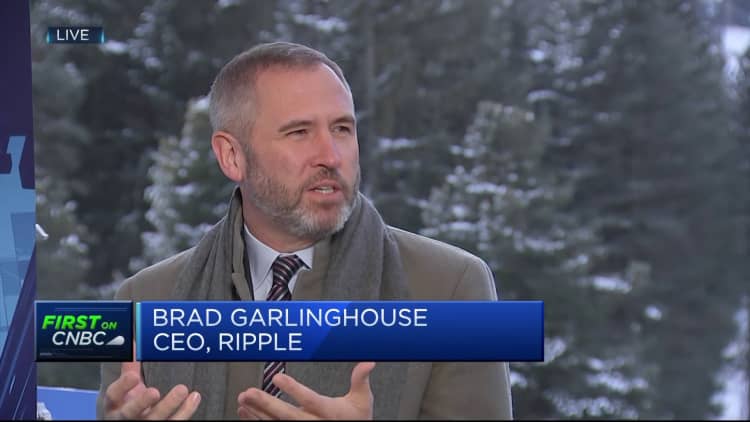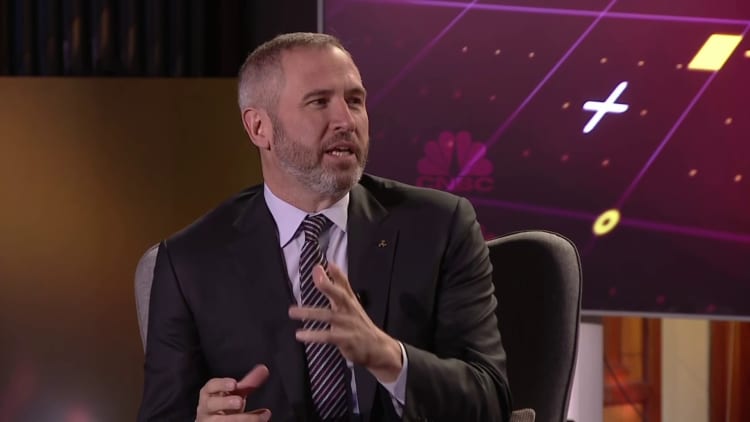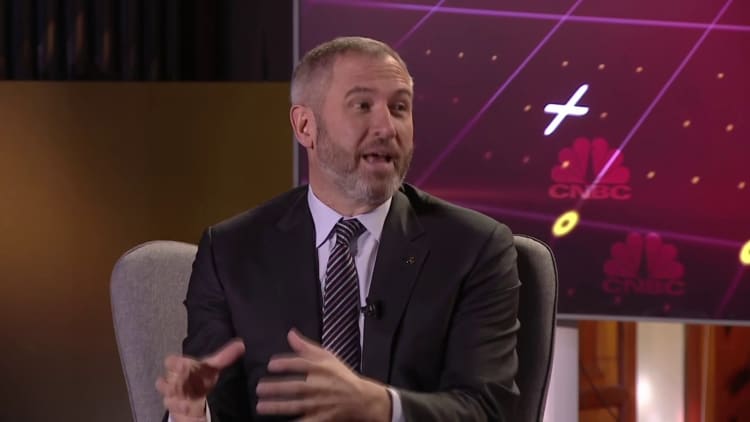
The head of cryptocurrency and blockchain company Ripple, Brad Garlinghouse says he is hopeful a resolution will be reached in its spat with the U.S. Securities and Exchange Commission within the first half of 2023.
“Judges take however long the judges will take,” Garlinghouse, who is a defendant in the legal drama, said in an interview with CNBC’s “Squawk Box Europe” Wednesday at the World Economic Forum in Davos, Switzerland. “We’re optimistic that this will certainly be resolved in 2023, and maybe [in] the first half. So we’ll see how it plays out from here. But I feel very good about where we are relative to the law and the facts.”
The U.S. Securities and Exchange Commission initiated a lawsuit against Ripple in 2020, alleging that the company and its executives illegally sold XRP — a cryptocurrency created in 2012 — to investors without first registering it as a security.
Ripple disputes the claim, saying that the token should not be considered an investment contract and is used in its business to facilitate cross-border transactions between banks and other financial institutions.
In December, Ripple and the SEC submitted their final round of briefs seeking a summary judgment to the case, respectively accusing each other of stretching the law.
The judge could make a ruling in favor of either side, avoiding a trial, or put the matter before a jury.
Ripple CEO Brad Garlinghouse speaks during the Milken Institute Global Conference in Beverly Hills, California, on Oct. 19, 2021.
Kyle Grillot | Bloomberg | Getty Images
Garlinghouse said that he expects a ruling to arrive “some time in the coming single digit months” — potentially as soon as June. He added that he doesn’t expect the company will settle the case, although he remains open to the prospect.
“We have always said that we would love to settle, but it requires one very important thing, and that is that, on a go-forward basis, it’s clear that XRP is not a security,” Garlinghouse said. “The SEC and Gary Gensler has very outwardly said he views almost all crypto as a security. And so that leaves very little space in the Venn diagram for settlement.”
At a September event organized by the Practising Law Institute, Gensler said that the “vast majority” of cryptocurrency tokens are securities.
He subsequently hinted that ether may also qualify as a security. Without referring to it by name, Gensler told reporters in September that crypto “staking” mechanisms — which reward users who deposit their tokens to secure blockchain networks with interest-like payments — should count as securities offerings, since “the investing public is anticipating profits based on the efforts of others.” Ethereum, the network behind the world’s second-largest cryptocurrency, switched to such a model last year.
The only cryptocurrency that the agency has made clear it doesn’t view as a security is bitcoin. Gensler previously stated that the world’s biggest cryptocurrency has “no group of individuals in the middle,” meaning investors aren’t “betting” on an intermediary.

The XRP case has important implications for both Ripple and the broader crypto market.
A judgment pronouncing XRP a security could potentially impose much stricter curbs on Ripple with respect to the token. This could include requirements for transparency disclosures and greater investor protections, akin to those imposed on regulated broker-dealers.
It may also set a precedent for dozens of other crypto and blockchain projects that could potentially be classified as securities.
Stressing the significance of the lawsuit’s outcome, Garlinghouse said on Wednesday, “Something I’ve heard here in Davos repeatedly is how important this is not just to Ripple… but also, really, the whole crypto industry in the United States.”
He added, “I keep reminding people that outside the United States, crypto is still thriving, Ripple’s still thriving, and we should make sure we’re continuing to engage non-U.S. regulators as well.”
‘Embarrassing’ behavior
In a separate fireside discussion with CNBC’s Arjun Kharpal Wednesday, Garlinghouse issued a stern rebuke of the SEC’s legal battle with his firm, saying the conduct of the watchdog so far had been “embarrassing.”
“From the beginning, I thought it was very clear that the facts were on our side, that the law was on our side,” he said. “And I think as you have seen this play out, as you have seen the filings in the court, that the judge certainly is hearing our arguments.”

He went on, “The SEC’s behavior in some of it has been embarrassing as a U.S. citizen. Just some of the things that have been happening, like you’ve got to be kidding.”
He said the U.S. is “notably absent” from the list of regulators developing crypto-friendly rules. The United Arab Emirates, Japan, Singapore, Switzerland and U.K. are some of the forerunners in this respect, in his view.
As part of the legal proceedings, Ripple fought to obtain documents related to a June 2018 speech from former SEC official Bill Hinman, which it says have aided the case. In the speech, Hinman says that sales of rival ether “are not securities transactions.”
XRP was once the third-largest cryptocurrency, commanding a $120 billion market value in early 2018. It has dropped sharply since, amid U.S. regulatory scrutiny and a wider downturn in bitcoin and other digital currencies. XRP now has a market capitalization of roughly $20 billion, according to CoinMarketCap data.

